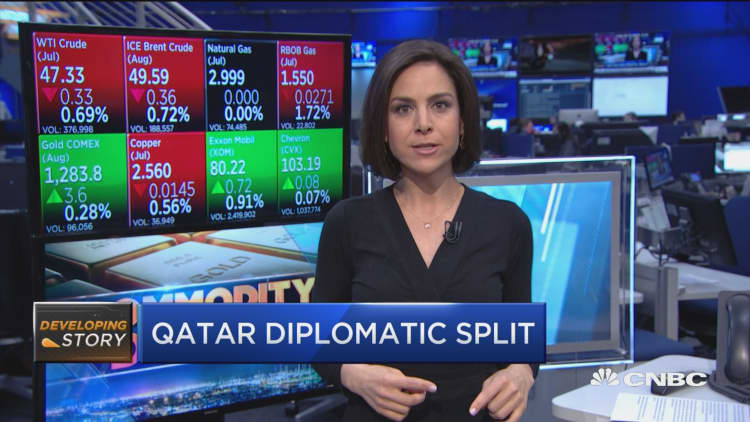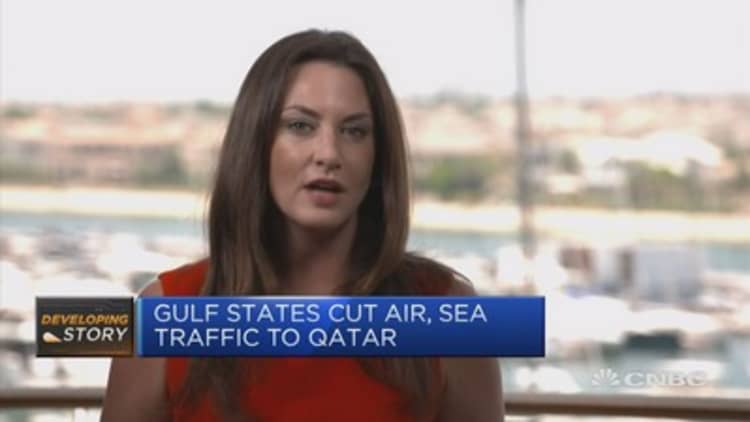
A sudden escalation in tensions between Qatar and other Gulf nations won't immediately upend oil and natural gas flows, but it does raise risks and make the outlook for the region less certain analysts say.
Oil prices were lower on Monday as the diplomatic crisis added to concerns about oil exporters' deal to limit output and boost crude prices.
Saudi Arabia, the United Arab Emirates, Egypt, Bahrain and other nations cut diplomatic ties and transportation links with Qatar in the steepest escalation since the nations recalled their diplomats from Doha in 2014. The nations are protesting Qatar's support for Islamist groups like the Muslim Brotherhood, alleging the tiny constitutional monarchy on the Persian Gulf is supporting terrorism.
In our view, there are no immediate risks for regional energy security, but the breakdown does pose the risk of an intensified proxy battle in Libya and possibly may even have implications for the U.S.'s forward airbase in Qatar.RBC Capital Markets
Qatar is a member of both the Gulf Cooperation Council and OPEC, which is coordinating an oil production cut among oil-producing nations to end a global crude glut that has left many Gulf countries with deficits.
But Qatar is one of the smallest crude oil producers in OPEC. It has agreed to cut just 30,000 barrels a day as part of the OPEC-led deal, compared with commitments from Saudi Arabia and the UAE to hold back 486,000 and 139,000 barrels a day, respectively.
Should Qatar exit the OPEC deal, it would not produce much of an impact, especially because the Saudis have been cutting beyond their quota as other members miss their targets, said Matt Smith, director of commodity research at ClipperData, which tracks shipments of energy products.
Iran, the third largest OPEC member, immediately denounced the Gulf states' actions. Qatar has positioned itself as an intermediary between Iran and other Gulf nations.
It is possible Iran could quit the deal in protest, but its production has topped out around 3.8 million barrels a day. It could struggle to increase output significantly following years of sanctions imposed over its nuclear program.
Qatar is one of the world's largest exporters of natural gas and the biggest shipper of liquefied natural gas, or LNG. But with the exception of natural gas sent through a pipeline to UAE, Smith does not think Qatar's energy exports will be disrupted much because most are shipped by seaborne tankers.
"These flows should continue to the key destinations and specifically in Asia. There shouldn't be too much of a disruption on that side of things. It's only the limitations that are being applied in the region," Smith told CNBC.
Map of Qatar, source: Energy Information Administration
Applying pressure on those exports would require the Saudi-allied nations to impose some sort of blockade on Qatar. That would mark a significant escalation, especially given that Doha hosts a critical U.S. military air base.
"In our view, there are no immediate risks for regional energy security, but the breakdown does pose the risk of an intensified proxy battle in Libya and possibly may even have implications for the U.S.'s forward airbase in Qatar," RBC Capital Markets said in a research note on Monday.
Qatar and Egypt have backed opposing sides in Libya's civil conflict, which has sidelined the country's oil supply.
But RBC sees little chance that Egypt will block Qatari tankers from the Suez Canal, and believes efforts to block Doha's shipments will have only a limited effect unless the situation deteriorates further.
However, Scott Modell, managing director at energy and geopolitical risk consultancy the Rapidan Group, noted that Saudi state media on Monday issued "some really tough language suggesting naval action against Qatar."

The Gulf states, which export vital food and building supplies to Qatar, can exert considerable pressure on Doha and may not be as lenient as they were during a 2014 diplomatic rift, some say.
Saudi Arabia and UAE, emboldened by President Donald Trump's support and his aggressive stance toward Iran, are unlikely to accept anything but absolute capitulation from Qatar on key foreign policy issues, the Eurasia Group said in a briefing on Monday. The risk consultancy sees increased chances of a coup as economic pressure potentially yields inflation, slower growth and higher borrowing costs.
"The Arab-Qatari rift will significantly undermine Qatar's economy, financial position, and the profitability of its businesses," Eurasia Group analysts said.
"The small Gulf state will basically need to establish new trade links to sustain its economy. Over the short term, there are few policy options to sufficiently mitigate damage."


